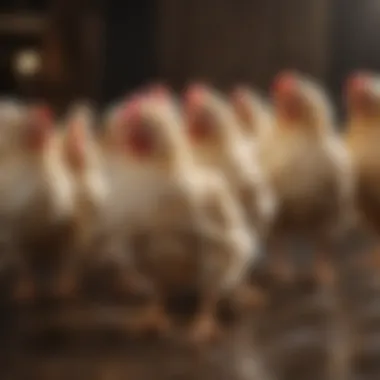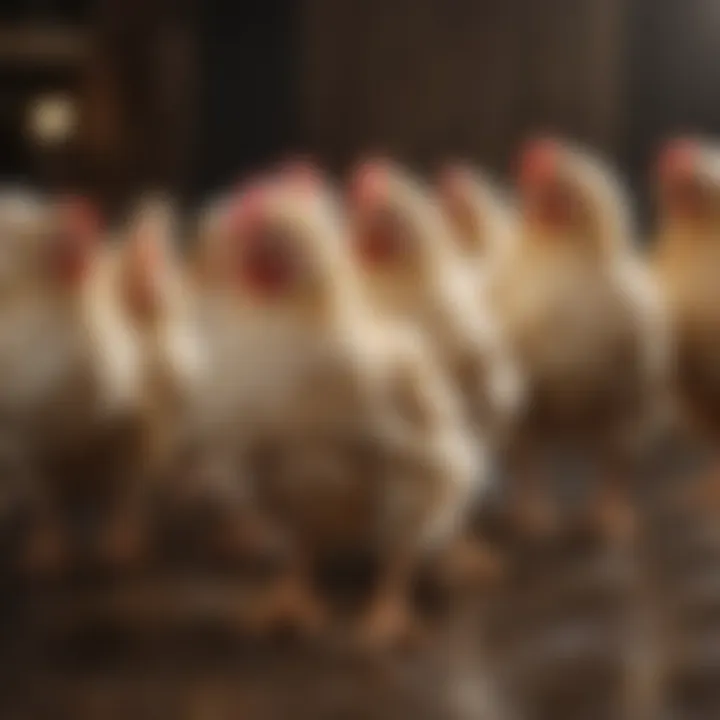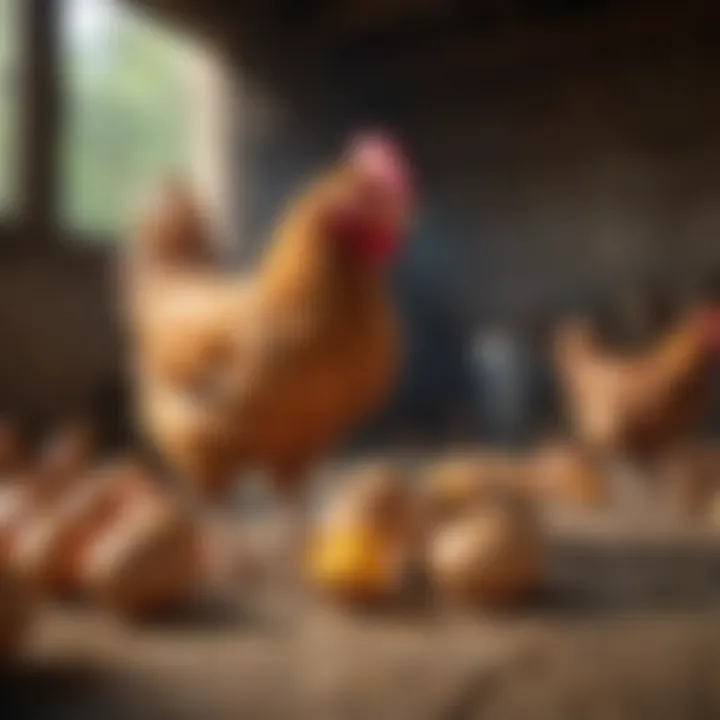The Essentials of Owning Egg Laying Chickens


Intro
Owning egg-laying chickens can be both rewarding and challenging. This journey begins with understanding key aspects that contribute to a successful chicken ownership experience. From selecting the right breeds to comprehending their care routines, the knowledge shared in this guide empowers both new and seasoned chicken keepers. The insights provided focus on practical tips, ensuring a thriving flock that produces fresh eggs daily.
Grooming Techniques
Grooming your chickens is esssential to maintaining their health and enhancing their overall well-being. Regular grooming sessions can prevent many common health issues, while also making the handling process easier. Here are some fundamental grooming techniques to consider.
Basic Grooming Tools
To effectively groom your chickens, it's vital to have the right tools. Some essential tools include:
- Comb and brush: Helps in removing dirt and debris from feathers.
- Nail clippers: Essential for keeping their nails trimmed and manageable.
- Dust baths: A natural way for chickens to keep their feathers clean and free of parasites.
- Molting supplements: Providing additional nutrients during molting can help maintain feather quality.
Step-by-Step Grooming Guides
The grooming process can be broken down into manageable steps:
- Begin with a visual check. Inspect feathers for any signs of dirt, parasites, or damage.
- Use a comb and brush. Focus on areas around the neck, back, and tail.
- Trim their nails carefully. Avoid cutting into the quick, as it causes pain.
- Offer a dust bath. Encourage your chickens to roll in the dust for natural cleaning.
- Monitor their behavior post-grooming. Look for signs of discomfort or distress.
Breed-Specific Grooming Needs
Different chicken breeds have varying grooming requirements. For instance, silky chickens require more feather care due to their unique feather structure. In contrast, broilers may have fewer grooming needs since their feathers are less prone to tangles. Researching specific breeds before acquiring them offers advantages in grooming management.
Health and Wellness
Monitoring the health of your chickens is critical for both their well-being and the productivity of your egg supply.
Nutrition and Diet Tips
Chickens require a balanced diet to lay eggs efficiently. High-quality layer feed, supplemented with grains, fruits, and vegetables can maintain their health and encourage egg production. Key nutrients include protein, calcium, and vitamins. Ensure clean water is constantly available.
Common Health Issues and Solutions
Common health problems include:
- Mites and lice: Use diatomaceous earth or natural treatments to control infestations.
- Respiratory issues: Maintain good ventilation in their housing to reduce dust and ammonia buildup.
- Egg binding: Recognize signs and consult a veterinarian if this occurs.
Importance of Regular Check-Ups
Regular health check-ups are necessary to detect potential issues early. A thorough examination should focus on examining the comb, wattles, and overall body condition. Keeping a close eye on these aspects can help in maintaining your flock’s health.
Training and Behavior
Training your chickens helps in managing their behavior, making it easier to handle them over time.
Basic Training Commands
Teaching basic commands can improve interactions. Start with simple cues such as “come” or “stay.” Consistency and patience are key in this process.
Understanding Common Behavioral Issues
Chickens may show aggression or stress if unaccustomed to human interaction. Identifying stressors in their environment is important. Too much noise or the presence of predators can lead to uneven behavior.
Techniques for Effective Training
Utilize positive reinforcement strategies, such as treats, to encourage desired behaviors. Establish a routine to help them adapt to your training methods.
Product Reviews
Selecting appropriate products is vital for effective chicken care. Some useful categories include grooming tools, health products, and training aids.
Comparison of Grooming Tools
When shopping for grooming tools, consider durability and efficiency. Brass or stainless steel combs tend to last longer and are easier to clean than plastic. A multi-purpose tool that includes nail clippers and cleaners may provide added value.
Best Pet Products for Health
Look for high-quality layer feeds like Purina Layena or Manna Pro Layer Pellets, as these products provide essential nutrients tailored for laying hens.
Review of Training Aids
Many training aids come in form of treat dispensers that reward positive behavior. Products from brands like PetSafe can effectively support training efforts.
Community Insights
Learning from other chicken owners is invaluable.
User-Submitted Tips and Tricks
Many owners recommend setting aside a specific time each day for handling chickens, making them more comfortable around humans.
Real-Life Grooming Experiences
Sharing personal experiences further enriches the knowledge base. Owners often share their favorite breeds based on ease of grooming and temperament.
Expert Guest Contributions
Consulting experts in poultry keeping can add depth. They often provide insights into unique feeding strategies or disease prevention techniques that vary with regions.


Owning chickens is a commitment that can provide numerous benefits, primarily fresh eggs and companionship. With proper care and attention, your flock can thrive.
Preface to Egg Laying Chickens
Owning egg-laying chickens is a practice that intertwines tradition with modern sustainability. As more individuals look toward self-sufficiency, the allure of keeping chickens at home has gained significant traction. These birds offer not only a source of fresh eggs but also promote an engaging and educational experience for owners.
Understanding Egg Production
Egg production is influenced by various factors including breed, age, and environmental conditions. Chickens typically start laying eggs around the age of five to six months. The rate can be affected by seasonal changes, with factors such as daylight affecting their laying patterns. To maximize egg output, it is beneficial to understand the specific needs of the breed being raised.
Some breeds, such as the Rhode Island Red or Leghorn, are particularly known for their prolific egg-laying capabilities. Providing proper nutrition, adequate light, and comfortable living conditions is essential for maintaining high production. A well-informed chicken owner can significantly impact their flock's productivity.
The Rise of Backyard Chickens
In recent years, the trend of keeping backyard chickens has surged. This movement can be attributed to several factors. Many are drawn to the idea of a more sustainable lifestyle, reducing reliance on store-bought eggs. There is an added advantage of having control over what the chickens eat, leading to healthier and tastier eggs.
The popularity of urban farming is also contributing to this trend. Communities are beginning to embrace local livestock, fostering a greater understanding of food systems. Zoning laws in many areas are evolving to accommodate small-scale chicken keeping. This shift reflects a growing appreciation for the benefits chickens can offer, including pest control and nutrient-rich waste that can enrich gardens.
Benefits of Keeping Chickens
Owning egg-laying chickens offers multiple advantages that go beyond the simple pleasure of raising animals. This topic is crucial to this article as it provides a clear understanding of why one might choose to embark on chicken ownership. The benefits span various aspects of daily life, from food production to the local ecosystem's health. Recognizing these benefits helps potential chicken owners make informed decisions and fosters a deeper appreciation for their feathered companions.
Fresh Eggs Daily
One of the standout benefits of keeping chickens is the availability of fresh eggs daily. Homeowners can enjoy a consistent supply of eggs that are not only fresher than those bought in stores but also richer in flavor. The freshness of home-raised eggs contributes to superior taste in dishes. Additionally, chickens can lay a surprising number of eggs; depending on the breed, a hen can produce anywhere from three to seven eggs per week.
Home-raised eggs typically have the bright yolk color and firm whites that many consumers crave. Moreover, owners have control over the chickens’ diet, which can enhance the nutritional quality of the eggs. For instance, feeding chickens a diet enriched with omega-3s can yield eggs high in these essential fatty acids. Lastly, collecting eggs daily becomes a routine that can bring joy and a sense of connection to the animals.
Natural Pest Control
Keeping chickens offers an organic solution to pest problems. Chickens are prolific foragers and will gladly eat up various insects and pests found around the yard, including ticks, spiders, and snails. This natural pest control can lead to a healthier garden environment without the need for harmful chemicals or pesticides.
By allowing chickens to roam freely in the garden, homeowners can harness their foraging instincts. They help control the insect population while also enriching the soil through their natural behavior. Not only does this make managing pests easier, but it also promotes a sustainable cycle that benefits both the chickens and the garden.
Nutrient-Rich Fertilizer
Another significant benefit of keeping chickens is their contribution to enhanced soil health through nutrient-rich fertilizer. Chicken manure is known for being high in nitrogen, phosphorus, and potassium, essential nutrients for plant growth. When properly composted, chicken droppings create a natural fertilizer that can improve plant health and yield.
Moreover, chickens help in aerating the soil. As they scratch and dig through the ground, they stir up the top layer, which can lead to improved drainage and root development for plants. Utilizing their waste as compost not only minimizes garden waste but also reduces the dependence on synthetic fertilizers, promoting an eco-friendly approach to gardening.
Keeping chickens provides a unique blend of benefits, cultivating a sustainable lifestyle while enjoying fresh food and natural pest control.
In summary, the benefits of keeping chickens extend to fresh eggs, natural pest control, and the production of nutrient-rich fertilizer. These aspects create a compelling case for anyone considering chicken ownership. The joys of having a productive, sustainable lifestyle await those willing to embrace the responsibility of raising these remarkable animals.
Choosing the Right Breed
Choosing the right breed of egg-laying chickens is crucial for every owner. This decision impacts egg production, the chickens' temperament, and their adaptability to the local environment. It is essential to consider what you want from your flock, whether it be a high yield of eggs, specific egg characteristics, or the personality traits of the chickens. Each breed has unique pros and cons, which can influence not just the quantity of eggs but also the overall experience of chicken ownership.
Popular Egg Laying Breeds
Rhode Island Red
Rhode Island Reds are a notable breed known for their resilience and egg-laying capabilities. They can produce a fair amount of large brown eggs and adapt well to various climates. The key characteristic of this breed is its hardiness. Rhode Island Reds can handle harsh weather conditions, making them a beneficial choice for many areas.
One unique feature of Rhode Island Reds is their robust health. They are less prone to diseases compared to other breeds, which simplifies their care. However, they can be aggressive, especially in establishing their social order within the flock. This characteristic can be a disadvantage if you want a more docile flock.
Leghorn
Leghorns are revered for their prolific egg-laying abilities. They often produce a high quantity of white eggs and are known for their active and assertive nature. The noteworthy aspect of Leghorns is their efficiency in egg production, often laying more than any other breed under suitable conditions.
Their unique feature is their low feed conversion ratio, meaning they require less food to produce more eggs. This can be a financial advantage. However, Leghorns may not be the best choice for beginners, as their vigorous behavior can lead to pecking issues if not managed correctly.
Orpington
Orpingtons are well-regarded for their friendly disposition and calm nature. They produce a moderate amount of brown eggs and are excellent pets due to their gentle temperament. The key characteristic of Orpingtons is their sociable behavior, making them suitable for families and first-time chicken owners.
A unique feature of this breed is its feathered body, which provides good insulation in colder climates. Yet, they may not be as prolific in egg production compared to other breeds. This could be a disadvantage for those seeking high egg yields but a benefit for others looking for companionship.
Considerations for Breed Selection
Climate Adaptability
Climate adaptability is an important factor when selecting a breed of chicken. This aspect ensures that the chickens can thrive in the local environment, whether it's hot, cold, or temperate. A breed that adapts well will produce eggs consistently and maintain better health.
The key characteristic here is that adaptable breeds possess features like thicker feathers for cold regions or larger body sizes for heat retention. This adaptability is beneficial because it reduces stress on the chickens, leading to better egg production results.
Egg Size and Color
Egg size and color are often deciding factors for chicken owners. Different breeds lay eggs of various sizes and colors, which can influence marketability if you plan to sell. The key characteristic is that some consumers prefer brown eggs while others favor white, and the size can vary too.
A unique feature about egg color and size is that they may reflect the chicken's diet and health. A well-balanced diet leads to healthier eggs. The disadvantage is that some owners focus too much on color rather than overall productivity and health.
Temperament
Temperament is a vital consideration when selecting chicken breeds. Temperament affects how chickens interact with one another and with humans. The key characteristic here is that friendly breeds make for better pets and can create a more enjoyable experience.
Unique features of chickens' temperament include their ability to socialize and establish pecking orders. Calm breeds are easier to manage, while more aggressive breeds might require additional attention to prevent issues. Balancing temperament with production benefits is essential for a rewarding chicken ownership experience.
Housing Requirements


Creating an appropriate housing environment for egg-laying chickens is crucial for their health and productivity. Proper housing protects the chickens from the elements as well as potential predators. Additionally, a well-designed coop enhances the quality and quantity of eggs produced. Ultimately, investing time and resources into understanding housing requirements will yield considerable benefits.
Designing the Coop
When designing a coop, it's necessary to consider both functionality and comfort. The size of the coop will depend on the number of chickens you plan to keep. A general guideline is to allocate at least 4 square feet per bird inside the coop and 10 square feet for the outdoor run. This space allows for easier movement, which reduces stress and aggression among chickens.
In terms of materials, opt for durable options that can withstand weather changes. Wood is a popular choice; however, metal can also be a viable option as it is easier to clean and more resistant to pests. Ensure the coop has adequate nesting boxes, ideally one box for every three to four hens, as this encourages egg-laying in a dedicated space.
Ventilation and Space Needs
Ventilation plays a significant role in maintaining a healthy coop environment. Adequate airflow helps to regulate temperature, reduce humidity, and minimize the accumulation of harmful ammonia gases from waste. Without proper ventilation, chickens can suffer from respiratory issues and decreased egg production. Include windows or vents that can be opened or closed as needed, based on the season.
The coop should also be spacious enough for your chickens to move freely. When chickens feel cramped, this can lead to stress, behavioral problems, and even health issues. In addition to providing adequate space within the coop, consider the layout of the outdoor run. This run should have places for dust bathing and foraging, which are important natural behaviors for chickens.
Predator Protection Strategies
Protecting chickens from predators is vital for their safety. Various animals, such as raccoons, foxes, and even birds of prey, can threaten your flock. To safeguard your chickens, it's essential to implement a few strategies.
- Secure Fencing: Use sturdy wire fencing that is buried a foot deep into the ground to deter digging predators. A fence that is at least 6 feet tall will help keep out climbing animals.
- Coop Security: Ensure that the coop door can latch securely, and consider using locks to further deter predators from entering at night.
- Regular Checks: Conduct routine inspections of the coop and run to identify any potential weak spots where a predator might gain access. Repair any damage promptly to maintain a safe environment.
- Motion Sensors: Installing motion-sensor lights around the coop can help deter nocturnal predators.
Remember, a well-secured coop not only protects your chickens but also conserves your investment in them and their productivity.
In summary, the housing requirements for egg-laying chickens encompass various components that all contribute to a suitable living environment. By carefully designing the coop, ensuring proper ventilation and space, and implementing predator protection strategies, you can create a safe and productive home for your flock.
Feeding and Nutrition
Feeding and nutrition is essential to the health and productivity of egg-laying chickens. Proper nutrition affects the quality of the eggs produced as well as the overall well-being of the flock. A well-balanced diet directly contributes to the incomes and health since hens require diverse nutrients for optimal egg laying and general vitality.
Formulating a Balanced Diet
A balanced diet for egg-laying chickens encompasses the right mixture of proteins, carbohydrates, fats, vitamins, and minerals. It is important to provide poultry with feed that promotes healthy growth and egg production. High-quality commercial layer feed is the most common option, often formulated with a proper balance of nutrients. Here are key components in formulating a balanced diet:
- Protein: Crucial for egg production. Look for feeds with around 16-18% protein.
- Calcium: Essential for eggshell formation. Offer sources like crushed oyster shells.
- Vitamins: A varied diet includes vitamins A, D, and E, which play roles in reproductive health.
- Grains: Whole grains like corn and wheat offer energy and should be included in moderation.
Make sure to provide fresh, clean water at all times. Chickens need water for digestion and overall health. Regularly inspect food and water sources to ensure they are clean and accessible. This attention to nutrition helps maximize egg-laying capabilities and maintain strong immune systems.
Supplementing with Treats
While commercial feed provides the base nutrition, supplements and treats can enhance the chickens' diet. However, treats should be given in moderation to prevent nutritional imbalances. Here are some ideas for beneficial supplements:
- Vegetable Scraps: Chickens enjoy various kitchen scraps, such as leafy greens, carrots, and pumpkin. These can provide necessary vitamins and minerals.
- Grains: Occasionally providing grains like barley or oats can contribute to their energy needs.
- Protein Sources: Mealworms or crickets can serve as excellent protein sources and are a tasty treat for chickens.
When giving treats, consider the 10% rule—no more than 10% of the total diet should come from treats. This ensures that hens still receive the essential nutrients found in their standard feed. Observe your chickens' reactions to new treats and adjust based on their preferences and health.
A well-fed chicken is a happy chicken, resulting in healthier eggs and a more vibrant flock.
Feeding and nutrition are critical in egg-laying chicken ownership. Understanding the dietary requirements ensures not just productivity but also fosters longer, healthier lives for the chickens.
Healthcare and Maintenance
Healthcare and maintenance are crucial components of successful chicken ownership. Ensuring that your flock is healthy not only prolongs their lives but also enhances egg production and overall welfare. Regular healthcare practices prevent diseases that could ravage your birds, while proper maintenance of their environment minimizes stress and provides a safe space for them to thrive.
Common Health Issues
Chickens are vulnerable to a variety of health issues. Among the most common concerns are:
- Respiratory Infections: Often caused by poor ventilation or overcrowding in the coop. Symptoms may include coughing, sneezing, and nasal discharge.
- Mites and Lice: External parasites that can lead to considerable discomfort and health decline. Regular inspections are essential.
- Coccidiosis: A parasitic disease affecting the intestinal tract, particularly in young chicks. Symptoms include diarrhea and weight loss.
To minimize the risk of these health issues, keep a keen eye on your chickens' behavior and physical appearance. Prompt identification and appropriate action can save lives.
Routine Check-Ups and Vaccinations
Just like any animal, chickens require routine check-ups. Regular health examinations help identify problems early. In addition to checking for visible signs of illness, vaccinations play a critical role in preventing diseases. Common vaccinations include:
- Marek’s Disease: A viral disease affecting the nervous system. Vaccination is highly recommended for all chicks.
- Newcastle Disease: A contagious viral disease that affects respiratory health. Preventative vaccination can save your flock.
Consult with a veterinarian to establish a proper vaccination schedule for your chickens. This will ensure they remain healthy throughout their lives.
Maintaining Cleanliness in the Coop
A clean coop is essential for the overall health of your chickens. Filthy living conditions can lead to disease outbreaks and unpleasant odors. To maintain cleanliness, consider the following practices:
- Regularly Remove Waste: Daily collection of droppings will help reduce bacteria and parasites.
- Deep Clean Periodically: A thorough cleaning at least once a month should be performed, including disinfecting surfaces and replacing bedding.
- Inspect and Repair: Regularly check the coop for signs of wear or potential hazards and fix any issues before they become problems.
Maintaining cleanliness in your coop is not just about aesthetics; it is a fundamental aspect of ensuring a healthy living environment for your chickens.
By prioritizing healthcare and maintenance, you will foster a vibrant and productive flock that provides fresh eggs and joy for years to come.
Understanding Egg Laying Cycles
Understanding the egg laying cycle is a vital aspect of successful chicken ownership. This topic helps poultry enthusiasts comprehend how their flock operates and enables them to maximize egg production. Knowing the cycles not only informs management practices but also enhances the overall health and well-being of the chickens.
Factors Affecting Egg Production
Several elements influence a hen's egg production capability.
- Age of the Hen: Younger hens typically start laying eggs around 18 to 20 weeks old. Older hens may lay fewer eggs as they age, often declining in production after two years.
- Breed Characteristics: Different breeds have distinct laying patterns. For instance, the Leghorn breed is known for its prolific egg-laying ability, while others, like Orpingtons, may produce fewer eggs.
- Lighting Conditions: Chickens require about 14 to 16 hours of light each day to maintain optimal egg production. Changes in daylight can lead to fluctuations in laying frequency.
- Nutrition: A balanced diet rich in proteins and calcium is essential for hens. Nutritional deficiencies can lead to reduced egg production and poor shell quality.
- Stress Factors: Environmental stressors such as temperature extremes, inadequate housing space, or the presence of predators can negatively impact laying frequency.
Seasonal Variations


Seasonality plays a significant role in egg production. During spring and summer, many hens tend to lay more eggs due to longer daylight hours and warmer temperatures. In colder months, laying can decrease due to reduced light. Adjustments in management practices, like providing artificial lighting during winter, can help mitigate lower production.
Additionally, seasonal molting is another factor that can temporarily halt egg production. When hens molt, they shed old feathers and grow new ones. During this time, their energy is focused on feather regeneration rather than egg production.
It is essential to monitor your hens throughout the year, adapting to the changes in their laying cycles to ensure consistent egg supply and overall flock health.
Being aware of these factors allows chicken owners to make informed decisions about care and management strategies to optimize egg production, further enhancing the benefits of owning egg-laying chickens.
Behavior and Social Structure
Understanding chicken behavior and social dynamics is crucial for any owner of egg-laying chickens. Chickens are social animals, and their well-being is closely tied to their social interactions. Recognizing how flock dynamics work can help you create a more harmonious environment for your chickens and improve egg production.
Understanding Flock Dynamics
Flock dynamics involve the relationships and interactions among chickens in a group. Chickens establish a pecking order, which is a hierarchical structure determining access to resources, such as food and nesting areas. This hierarchical system is largely maintained through behaviors like pecking, vocalizations, and body language.
Positive flock dynamics can lead to reductions in stress levels and an enhanced overall health of your chickens. Chickens that feel safe are more likely to lay eggs consistently. Here are some key elements to consider:
- Social Structure: The pecking order is essential for minimizing conflicts. Higher-ranking chickens have priority over lower-ranking ones.
- Communication: Chickens use a variety of sounds and postures to convey feelings or alert the flock to danger. Observing these cues can help you assess the mood of your chickens.
- Cohesion: Keeping a consistent and stable group is vital. Introducing new chickens can upset the established order, resulting in stress and aggression.
It's essential to monitor the interactions among your chickens to ensure that all members of the flock are thriving and free from undue stress.
Dealing with Aggression and Pecking Order
When establishing a flock, owners may encounter issues with aggression and the inevitable pecking order disputes. Recognizing and effectively managing these issues can lead to a balanced social structure. Here are some strategies:
- Introduce New Chickens Gradually: If you're adding new chickens, do so slowly and keep them separated initially. This helps all birds acclimatize without intense confrontations.
- Provide Adequate Space: Overcrowding can amplify aggressive behavior. Ensure each bird has enough room to move and establish its territory.
- Use Environmental Enrichment: Providing distractions, such as perches or dust baths, can reduce tension in the flock and minimize aggressive interactions.
- Monitor Behavior: Pay attention to aggressive pecking. If one chicken is consistently bullying others, consider separating them temporarily to reduce stress.
- Nutritional Needs: Ensure a balanced diet. Sometimes, aggression stems from competition over food. Scheduled feeding times and multiple feeding stations can alleviate this.
Keeping a harmonious chicken flock requires observation and management of dynamics. Anticipate and address issues to foster a peaceful atmosphere conducive to good health and egg-laying.
Fostering a positive environment is beneficial not just for chicken welfare but also for quality egg production. By understanding and managing chicken behavior and social structure, owners can enhance the enjoyment of their egg-laying ventures.
Legal Considerations
Understanding the legal framework is essential for anyone considering raising egg-laying chickens. Ignoring these regulations can lead to unexpected issues such as fines or the need to rehome your flock. Each region has its own set of laws governing poultry ownership, zoning, and other considerations that can impact the enjoyment of your daily life with chickens. Awareness of these parameters not only ensures compliance but also fosters responsible chicken ownership.
Zoning Laws and Regulations
Zoning laws dictate where you can keep chickens. Many municipalities have specific areas designated for agricultural use, and keeping chickens within residential zones may be restricted or controlled. These regulations often stipulate the number of chickens a household can own and may require adequate space for each animal.
Key considerations include:
- Residential vs. Agricultural Zones: In residential areas, there may be stricter limitations on the number of chickens you can keep. Ensure you reference local regulations.
- Distance Requirements: Many laws require that chicken coops be a certain distance from neighboring properties.
- Noise Regulations: Roosters, while not generally kept for egg production, can be noisy and may not be allowed in residential areas.
It’s advisable to check your local government's website or contact their office for specifics. Doing this could save time and effort later.
Permits and Licensing
In some regions, you may be required to obtain permits for poultry ownership. This serves several purposes, including health inspections and ensuring that animal welfare standards are met. The need for permits varies significantly based on location and the size of your flock.
Points to consider are:
- Type of Permit Required: Some areas require a general animal permit, while others may have specific permits for poultry.
- Health Inspections: You may need to have your coop inspected for cleanliness and safety standards.
- Annual Fees: Be prepared for potential fees associated with the permits; this is a standard requirement in many jurisdictions.
Understanding the legal aspects of chicken ownership is crucial for ensuring a seamless experience and protecting your investment in your flock.
In summary, being informed about zoning laws and obtaining the necessary permits can help you avoid conflicts and foster a harmonious environment for your chickens and neighbors. Taking these steps ensures that you can enjoy the full benefits of raising egg-laying chickens responsibly.
Sustainability and Ethical Considerations
Sustainability and ethical considerations play a crucial role in the realm of backyard chicken ownership. Understanding these elements not only enhances the welfare of your chickens but also contributes to broader environmental goals. The integration of sustainable practices ensures that chicken keeping is not just a hobby but a responsible endeavor that aligns with modern ethical standards.
Ethical Treatment of Chickens
Ethical treatment of chickens encompasses a variety of factors that ensure their well-being. Chickens should be kept in environments that allow for natural behaviors, such as foraging and socializing. Providing adequate space in the coop and access to outdoor areas aids in reducing stress and ensuring overall happiness. It is important to prioritize their needs through:
- Adequate living space: Each chicken requires enough room to move freely and comfortably. Overcrowding can lead to health problems and behavioral issues.
- Access to fresh air and sunlight: Outdoor access to sunlight supports their health and encourages natural behaviors.
- Nutritional diet: Feed their nutritional needs with balanced diets, which includes grains and greens, necessary for optimal health.
By adhering to these principle, you ensure that your chickens lead fulfilling and productive lives, which, in turn, leads to better egg production.
Promoting Biodiversity
Promoting biodiversity is another vital aspect of chicken ownership. Different chicken breeds contribute to diversity, which benefits both the environment and the chicken-keeping community. Opting for a variety of breeds can result in:
- Resilience: Diverse breeds can withstand changing climates and resist diseases more effectively than homogeneous flocks.
- Genetic variety: A wider gene pool can reduce the risk of hereditary health problems or vulnerabilities.
- Cultural heritage: By raising traditional or heritage breeds, chicken owners can help preserve genetic diversity and cultural practices associated with poultry keeping.
By cultivating a diverse flock, you not only support animal health but also enrich your own experience as a chicken owner.
Embracing sustainability practices and promoting the ethical treatment of chickens leads to a more responsible and fulfilling chicken-keeping experience. This reflects broader values and connections to the planet and its ecosystems.
Culmination
In this article, we have navigated the various dimensions of owning egg-laying chickens. Understanding the significance of conclusion is essential as it encapsulates the knowledge shared throughout. By reflecting on the benefits of chicken ownership, potential owners can grasp the full impact of integrating these creatures into their lives.
Reflecting on the Benefits of Chicken Ownership
Owning chickens offers a myriad of advantages that extend beyond just fresh eggs. First, the process fosters a connection with nature and food production. The responsibility of caring for chickens teaches valuable lessons in sustainability and animal husbandry.
Another significant benefit is the production of nutrient-rich eggs. Fresh eggs from backyard chickens often surpass those sold in supermarkets in terms of quality and flavor. Knowing the conditions your hens live in can bring peace of mind.
Additionally, chickens provide natural pest control. They instinctively forage for bugs and weeds, aiding in keeping the yard tidy without the use of chemicals.
Key benefits include:
- Fresh, nutritious eggs: Raising chickens allows for control over their diet and living conditions.
- Ecological benefits: Chickens contribute to soil health through their droppings, which serve as an excellent natural fertilizer.
- Community connection: Engaging with fellow chicken keepers fosters a sense of belonging and shared knowledge.
- Educational opportunities: Both children and adults can learn about biology, ecology, and sustainable practices through hands-on experience with chickens.
“Chicken ownership transforms the mundane into the meaningful.”







